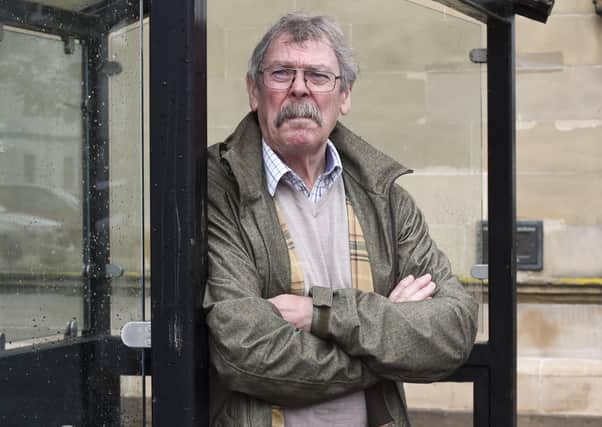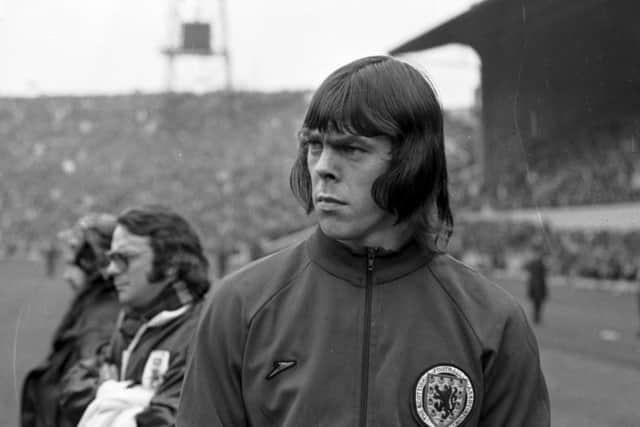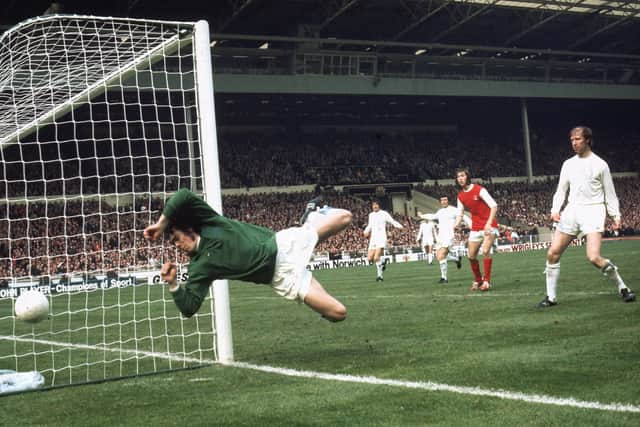Scotland and Leeds great David Harvey tracked down after leaving Orkney hideaway


Track and trace is not a concept one might expect would gain David Harvey’s approval. After all, it seems he has spent much of his later life fleeing detection.
And yet, he visibly brightens because, having given his name and contact details, the information elicits no flicker of recognition from the owner of the pleasant Borders tearoom where we’ve taken shelter from the drizzle. “I was a bit worried here, what with taking the photographs,” he says. “No one knows who I am. It took the manager at the caravan site about five years to suss out I played football.”
Advertisement
Hide AdAdvertisement
Hide AdHarvey, now 72, has been coming to this area on holiday since buying a static caravan in Greenlaw, about seven miles away from our appointed meeting place of Duns. A town more commonly associated with another Scottish sports icon, the racing driver Jim Clark, is where my own track and trace operation in search of someone often portrayed as reclusive has come to an end. Which is the first surprise.


After all, on the occasions when Harvey’s name has come up in recent times, it’s most often in relation to that exclusive subset of former World Cup goalies who ended up becoming posties on remote Scottish islands. Peter Bonetti, god rest him, was one – on the isle of Mull. And Harvey was the other – in Orkney, his last known location.
They could have relayed their future plans to one another while keeping goal in the 1970 FA Cup final relay between Leeds United and Bonetti’s Chelsea, which was watched by 28 million viewers on television. This was one of Harvey’s early breakthrough matches after he replaced the brilliant but erratic Leeds No 1 Gary Sprake, who had made a mistake in the first game.
Bonetti passed away in the Spring. “We have had a bad spell,” says Harvey, who’s mourning the loss of several team-mates, including Paul Madeley, Trevor Cherry and Norman Hunter. These deaths, sudden in the case of Cherry, have lent considerable poignancy to Leeds’ belated return to the Premier League this week after an absence of 16 years. This achievement under Marcelo Bielsa has stoked a desire to seek out Harvey, one of the club’s undoubted greats in two spells totalling nearly 20 years’ service. He was there for the good times, he was there for the relatively bad times as they battled to regain their top-flight status in the mid-1980s.
“I was captain for a couple of seasons,” he says, in a lilting Yorkshire via Kirkwall accent. “You had that extra responsibility. I found it absolutely draining. So when I left again, I was glad in a way. That was the pressure off. We were under pressure. But they – the current team – were under serious pressure. I take my hat off to them. And it’s a great tribute to those we’ve lost…”


Most recently, of course, it was Harvey’s great friend Jack Charlton who departed for the great Spion Kop in the sky. His funeral took place the day before we met in Ashington, not all that very far from Duns. Harvey’s not good with goodbyes – he made the recent flit from Orkney to the mainland without a farewell, just days before lockdown began.
“I find it hard,” he says. “I know everyone finds it hard. But I find it really, really hard. When Don Revie got motor neurone’s I had always known the Boss as a fit man. He used to train with us. And then there was a game at Elland Road [in 1987] to raise funds for motor neurone. I had probably seen him about six months before this and for all he was not 100 per cent fit, he was not bad to look at. I saw him at this game, and he was in his wheelchair by this time. As usual I was late, so I was the last one there. I think he thought I was not coming. And his face when I walked in just lit up. But he could hardly speak. That’s my last memory [of him]…”
He owes everything to Revie. “My whole career,” he says. “Him and Billy [Bremner]. If it had not been for Billy I would never have played for Scotland apart from the England v Scotland games during training at Leeds. I was not being recognised put it that way. Bremner chipped away until I think the Doc just thought: ‘I will take a chance’.” Tommy Docherty was replaced by Willie Ormond, who went with Harvey as his goalkeeper for Scotland’s unbeaten World Cup campaign in 1974. He only conceded once and kept a clean sheet v Brazil. He’s said to have been voted the best goalkeeper at the tournament though details are vague. “I didn’t get anything for it!” he says.
Advertisement
Hide AdAdvertisement
Hide AdAnd then there’s Charlton’s part in getting Harvey his chance at Leeds after a prolonged spell as understudy to Sprake.
“It was Jack that got me into the team in the first place because he was moaning that much about Gary. He was one of the few people who could speak to the Boss the way he did. He said something along the lines of … ‘if you play that so-and-so again you can count me out. Play that whatshisname instead, that young boy’, talking about me. A few weeks later I did play.
“The very first game Jack said, ‘if you come for crosses just shout and come and get it’. So after about ten minutes the ball got crossed in and I have come out for it and I have gone to punch it…he was spark out. I had hit him. I was stood there waiting for him to come round… What a start.”
Their relationship overcame that early bump. “He was a lovable rogue,” says Harvey. “I used to have racing greyhounds. Every now and again a dog gets a rest and you take it out lamping or go shooting, just to freshen them up a bit, and Jack and I would go up Ilkley Moor.”
They did a lot together, although Charlton could not tempt Harvey to join him fishing. “I don’t have the patience for it,” he says.
Harvey liked to get away from it all but he wanted to be active, always active. He rode horses at the gallops at trainer Frank Carr’s stable in Malton – while he was still playing: “The Boss would have gone mental if he’d known”.
He also once owned a pet monkey called Jenny, whose death – suicide, according to Sprake in an old interview – drew the level of sympathy expected from a dressing-room full of some of the most battle-hardened footballers ever assembled. Being good with his hands, naturally, Harvey had set up an elaborate heating system in its cage. “Monkeys being clever things, it worked it out,” he recalls. “Unbeknownst to me, it fiddled with it and died of gas inhalation – it wasn’t suicide. But you know what football players are like…”
Nevertheless, he missed the banter of the dressing-room when he finished playing, after a short chapter in the Scottish leagues with a handful of appearances for Morton and one match for Partick Thistle. He also had a stint at Harrogate Town, where he said he knew it was time to hang up his gloves when someone threw a walking stick into his penalty area.
Advertisement
Hide AdAdvertisement
Hide Ad“I used to go into a pub in Knaresborough, where I lived at the time. There were four or five lads who were postmen. And they used to have me in absolute stitches. It sounded to me just like a dressing-room atmosphere. Knaresborough is only a small area. In big postal areas you might have 100-200 postmen – that would not suit me at all. But in Knaresborough there were only 30.”
And on Sanday, the largest of Orkney’s north isles, there were just two. Harvey bagged one of the precious positions after moving to Orkney just over a quarter of a century ago – he originally dreamed of living somewhere on the west coast. Joining him were wife June and five daughters, the youngest of whom, Heather, was just ten months old. He also has four children, two sons and two daughters, from his first marriage. This information helps answer the pressing question – why leave Orkney now? What’s changed? Surely this isn’t something else to pin on Boris Johnson, who visited the islands on Thursday.
“We have 19 grandchildren,” he explains. “It is hard for them to get there. It was easier for us to go to them.” His children are scattered from Belgium to Kelty. He and June, his wife, are relocating to Dumfries and Galloway. In fact, they move there this weekend – along with June’s mother, who is making the switch to Scotland from outside Rotherham in her 100th year (she turns 100 in December).
“It is as near as I am going to get to Sanday in terms of attitude,” he says.
Of all the revelations about his life, one of the least surprising things Harvey tells me is that he no longer has any souvenirs from his football career. No medals, no shirts, nothing. “I gave it all away to charity,” he says.
What about that red Scotland shirt he used to wear during games? Nothing unusual about that, of course – except he was playing for Leeds United at the time. “You want every bit of help you can get, don’t you,” he shrugs, when explaining this sartorial oddity. It became a superstition, along with not smiling in photographs. “You are under contract to wear certain stuff,” he continues. “I just sneaked it on. Once you’ve done it once they have to let you do it again.”
He has travelled light from Orkney but there’s plenty of emotional baggage to cope with. He will never return to Sanday because the pain would be too great. “It was paradise,” he says.
“I know of two paradises – Celtic and Sanday,” he continues. Despite growing up in Yorkshire, Harvey is a fervent Celtic fan. It’s not even something he can say he picked up from his Ayrshire-raised father, who was a Kilmarnock supporter.
Advertisement
Hide AdAdvertisement
Hide AdIn this respect, life in Orkney – predominantly Rangers-supporting, he estimates – could be challenging. “It was hard when Rangers were going for ten-in-a-row,” he says.
It was one of few drawbacks. “Sanday would not suit everyone,” he continues. “If you fancy going out quite a bit it is a no no. It would drive you mental on Sanday. There is plenty to do if you have any kind of imagination at all. I mean, there’s wildlife, gardening, the sea. There were two pubs on the island, a couple of restaurants. The Milky Way, the dancing lights. And there were only 500 of us.
“When I was a postman, I lost a cow one day. It died unexpectedly and by the time I had finished my round my neighbour had been down with a tractor, taken the cow away and buried it before I even got back.
“They have the attitude if an incomer wants to be left alone, they are happy to leave you alone and if you are happy to mix, they are happy to mix,” he adds.
Two of the five gardens surrounding his house on Sanday sloped down towards the sea. “The sands are white,” he recalls. “The only things missing from, say, the Bahamas are the heat and the palm trees.”
He could have died there – and nearly did. On Christmas night 2009, he suffered a heart attack. His father, a shotfirer at mining sites and part-time singer, died at 60 from the same cause. Harvey reached 61 and felt like he had dodged a bullet. The next thing he knew he was being revived by a district nurse handily based at his end of the island. He underwent a quadruple bypass operation in Edinburgh. “It was meant to be a triple but while they were in there they thought we might as well do all four,” he says, impressed by the practicality involved.
He feels as if he’s had his quota of near-death experiences. “Three times I have cheated it. That’s me finished now. There’s no way I can do it again.” He broke his neck while playing for Vancouver Whitecaps. “Apparently if you are going to break your neck anywhere in the world then Vancouver is the place to do it,” he says. “The top boys are all there.” Because he got so nervous before games, he used to take a sleeping tablet on the eve of matches. He could not get his normal prescription in Canada and changed brand.
“At the time I was stopping at my uncle and auntie’s in Vancouver,” he recalls. “I was living in the basement. I have taken a tablet and said goodnight to them and then gone down to the basement. For some unknown reason I have picked up my car keys – I don’t even know where I was going.
Advertisement
Hide AdAdvertisement
Hide Ad“I only made it 200 yards.” He drove straight into the back of a parked vehicle. “The surgeon said to me that most people break their neck forward – but I broke it going back the way.” This saved his life apparently. And then there was the car crash in 1975 that meant he missed out on Leeds’ European Cup final v Bayern Munich. Again, it could have been a lot worse – for the club as well as Harvey, with Gordon McQueen, who was driving, and Frank Gray also involved. Harvey broke his ankle and fellow Scot David Stewart took his place in goal. He has no problem reconciling himself to missing out on that opportunity considering what could have happened. “We were lucky,” he says. “The car was a write-off.”
All these tales. No wonder he will be missed on Sanday.
“Obviously people knew we were leaving,” he says. “But I did not tell them when. We just jumped on the boat and left. I could not say cheerio. I will never go back to Sanday. People say ‘will you go back?’. I will never go back. I will go back to mainland Orkney because I get my eyes done there – I am not going to change my optician – but not Sanday.”
His eyesight is another intriguing talking point. Short-sighted in one eye, long-sighted in the other, he started wearing glasses in his mid-twenties, much to Brian Clough’s displeasure. He tried to exchange Harvey and Hunter plus money for Leicester City’s Peter Shilton during his short reign. With contact lens use still unusual, Harvey soldiered on, sometimes failing to compensate such as the time at Everton when he dived too early – “or was it too late?” he wonders – and watched a tame shot evade him.
“I got out the bath first rather than my usual last,” he recalls. “In the players’ lounge was Freddie Starr. I am the first player in and he’s the first person I meet. He just burst out laughing. I have had enough of this. I am just about to get belted into him. How I never seen these two boys, but he had two bouncers with him. They lifted me up by the elbows, my feet were off the floor. They took me into the corner and said: ‘are you going to be a good boy?’”
Harvey’s career is a treasure trove of stories. He was a grafter who made the best of himself and while there was luck involved, he deserved it.
“I started training at Elland Road when I was 11. I just assumed – and this was so arrogant – that I would be taken on as an apprentice. I got to 15, left school – no phone call. I headed to a shoe factory.
“Then the lad who was goalkeeper for the junior team broke his leg. Two weeks I was in that factory.”
His football career might never have happened and in a way it didn’t. “When people ask me if I am retired and I say aye, they’ll ask: ‘what did you do?’ I tell them I was a postman. It’s not a lie, is it?”
A message from the Editor:
Advertisement
Hide AdAdvertisement
Hide AdThank you for reading this story on our website. While I have your attention, I also have an important request to make of you.
With the coronavirus lockdown having a major impact on many of our advertisers - and consequently the revenue we receive - we are more reliant than ever on you taking out a digital subscription.
Subscribe to scotsman.com and enjoy unlimited access to Scottish news and information online and on our app. With a digital subscription, you can read more than 5 articles, see fewer ads, enjoy faster load times, and get access to exclusive newsletters and content. Visit https://www.scotsman.com/subscriptions now to sign up.
Our journalism costs money and we rely on advertising, print and digital revenues to help to support them. By supporting us, we are able to support you in providing trusted, fact-checked content for this website.
Joy Yates
Editorial Director
Comments
Want to join the conversation? Please or to comment on this article.